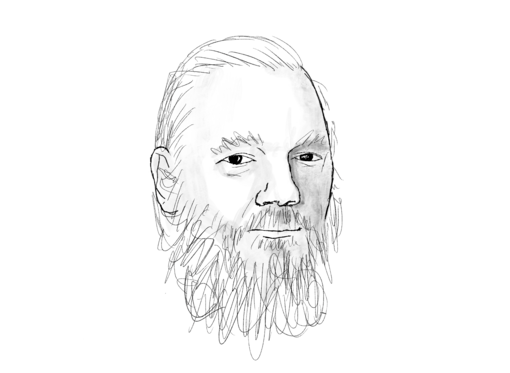
Drawing by Nathaniel St. Clair
It may appear unnecessary to repeat the truism that democracy depends on transparency and accountability, and yet, how often has the democratic order been betrayed by our leaders in the recent past? How often have the media abandoned their watchdog function, how often have they simply accepted the role of an echo-chamber for the powerful, whether government or transnational corporations?
Among the many scandals and betrayals of democracy and the rule of law we recognize the persecution of inconvenient journalists by governments and their helpers in the media. Perhaps the most scandalous and immoral example of the multinational corruption of the rule of law is the “lawfare” conducted against Julian Assange, the founder of Wikileaks, who in the year 2010 uncovered war crimes and crimes against humanity committed by the United States and its NATO allies in Afghanistan and Iraq.
In a world where the rule of law matters, these war crimes would have been promptly investigated, indictments would have been issued in the countries concerned. But no, the ire of the governments and the media focused instead on the journalist who had dared to uncover these crimes. The persecution of this journalist was a coordinated assault on the rule of law by the United States, United Kingdom and Sweden, later joined by Ecuador. The instrumentalization of the administration of justice – not for purposes of doing justice, but to destroy a human being pulled more and more people into a joint-criminal conspiracy of defamation, trumped-up charges, investigations without indictment, deliberate delays and covers-up.
In April 2021 my colleague, Professor Nils Melzer, the UN Rapporteur on torture, published a meticulously researched and methodically unassailable documentation of this almost incredible saga. His book, The Case of Julian Assange (Piper Verlag, München 2021), can well be called the “J’accuse” of our time, reminding us how our authorities have betrayed us, how four governments colluded in the corruption of the rule of law. Like Emile Zola, who in 1898 exposed the web of lies surrounding the scandalous judicial framing of the French Colonel Alfred Dreyfuss in France, Nils Melzer shocks us 122 years later with proof of how countries that are ostensibly committed to the rule of law and human rights can betray the democratic ethos with the complicity of the mainstream media. Melzer writes about “concrete evidence of political persecution, gross arbitrariness on the part of the administration of justice and deliberate torture and abuse.”
This is an enormously important book because it requires us to abandon our “comfort zone” and demand transparency and accountability from our governments. Indeed, it is scandalous that none of the four governments involved in the frame-up cooperated with Professor Melzer and only answered with “political platitudes.” Me too, I experienced the same lack of cooperation from powerful countries to whom I addressed notes verbales concerning violations of human rights – none of them responded satisfactorily.
Melzer reminds us of Hans-Christian Andersen’s fable “The Emperor’s new clothes”. Indeed, everyone involved in the Assange frame-up consistently maintains the illusion of legality and repeats the same untruths, until an observer says – but the emperor has no clothes! That is the point. Our administration of justice has no clothes and instead of advancing justice, it colludes in the persecution of a journalist, with all the implications that this behaviour has for the survival of the democratic order.
Melzer convinces us with facts that we are living in a time of “post-truth”, and that it is our responsibility to correct this situation now, lest we wake up in a tyranny.